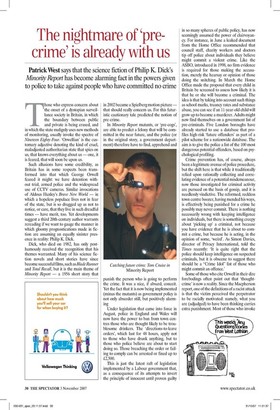The nightmare of 'pre- crime' is already with us
Patrick West says that the science fiction of Philip K. Dick's Minority Report has become alarming fact in the powers given to police to take against people who have committed no crime Those who express concern about the onset of a dystopian surveillance society in Britain, in which the boundary between public and private is being erased, and in which the state malignly uses new methods of monitoring, usually invoke the spectre of Nineteen Eighty-Four. 'Orwellian' is the customary adjective denoting the kind of cruel, maladjusted authoritarian state that spies on us, that knows everything about us — one, it is feared, that will soon be upon us.
Such allusions have some credibility, as Britain has in some respects been transformed into that which George Orwell feared it might: we have detention without trial, armed police and the widespread use of CCTV cameras. Similar invocations of Aldous Huxley's Brave New World — in which a hopeless populace lives not in fear of the state, but is so drugged up as not to notice, or care, that they live in such dreadful times — have merit, too. Yet developments suggest a third 20th-century author warrants rereading if we want to gauge the manner in which gloomy prognostications made in fiction are assuming an equally sinister presence in reality: Philip K. Dick.
Dick, who died on 1982, has only posthumously received the recognition that his themes warranted. Many of his science fiction novels and short stories have since become successful films, such as Blade Runner and Total Recall, but it is the main theme of Minority Report — a 1956 short story that in 2002 became a Spielberg motion picture — that should really concern us. For this futuristic cautionary tale predicted the notion of pre-crime.
In Minority Report mutants, or 'pre-cogs', are able to predict a felony that will be committed in the near future, and the police (or in the original story, a government department) therefore have to find, apprehend and punish the person who is going to perform the crime. It was a nice, if absurd, conceit. Yet the fact that it is now being implemented (minus the mutants) as government policy is not only absurder still, but positively alarming Under legislation that came into force in August, police in England and Wales will now have the power to ban from town centres those who are thought likely to be troublesome drinkers. The 'directions-to-leave orders', which last for 48 hours, apply not to those who have drunk anything, but to those who police believe are about to start doing so. Those breaching the order or failing to comply can be arrested or fined up to £2,500.
This is just the latest raft of legislation implemented by a Labour government that, as a consequence of its attempts to invert the principle of innocent until proven guilty in so many spheres of public policy, has now seemingly assumed the power of clairvoyancy. For instance, in June a leaked document from the Home Office recommended that council staff, charity workers and doctors tip off police about individuals they believe might commit a violent crime. Like the ASBO, introduced in 1998, no firm evidence is required for those making the accusation, merely the hearsay or opinion of those doing the snitching. In March the Home Office made the proposal that every child in Britain be screened to assess how likely it is that he or she will become a criminal. The idea is that by taking into account such things as school marks, truancy rates and substance abuse, you can see if an 11-year-old child will grow up to become a murderer. Adults might now find themselves on a government list of pre-criminals. Five London boroughs have already started to use a database that profiles high-risk 'future offenders' as part of a pilot scheme for a nationwide database. The aim is to give the police a list of the 100 most dangerous potential offenders, based on psychological profiling.
Crime prevention has, of course, always been a legitimate avenue of police procedure, but the shift here is that while it traditionally relied upon rationally collecting and correlating evidence of a potential misdemeanour, now those investigated for criminal activity are pursued on the basis of gossip, and it is needlessly vindictive. The reformed, reckless town centre boozer, having mended his ways, is effectively being punished for a crime he possibly may never commit. There is nothing necessarily wrong with keeping intelligence on individuals, but there is something creepy about 'picking up' a criminal, not because you have evidence that he is about to commit a crime, but because he is acting, in the opinion of some, 'weird'. As Simon Davies, director of Privacy International, told the Times recently: 'It is quite right that the police should keep intelligence on suspected criminals, but it is obscene to suggest there should be a "Crime Idol" list of those who might commit an offence.'
Some of those who cite Orwell in their dire forebodings often point out that 'thoughtcrime' is now a reality. Since the Macpherson report, one of the definitions of a racist attack is that the victim perceived the perpetrator to be racially motivated: namely, what you are (adjudged) to have been thinking carries extra punishment. Most of those who invoke Orwell, however, refer principally to the fact that we are the most spied-up nation on the planet, what with more than 42 million CCTV cameras in operation in the UK. But Big Brother is no longer merely watching us, he will soon be apprehending us for things we are about to do. Trials using 'smart CCTVs' were first carried out in London's Liverpool Street station in 2003. The new software, called the Intelligent Pedestrian Surveillance system, draws attention to loiterers or those whose body movement suggest intention to commit crime. Although the trial was abandoned after too many false alarms, plans are still afoot to have a similar system working on the London Underground network.
Scientific and technological advances are being made elsewhere. In February neuroscientists at the Max Planck Institute for Human Cognitive and Brain Sciences in Germany announced a technique using highresolution brain scans that allows them to look inside a person's brain and read their intentions. The new procedure was the culmination of a series of recent studies which demonstrate that certain brain patterns can be linked to telling lies and triggering violent and racist behaviour. The problem here is that were such a process to become part of the judicial system, any finding that scientifically 'proved' you were going to commit a crime would be irrefutable: there would be no possible way of proving that you weren't going to commit a felony. Pre-crime negates the notion of free will.
The validity now accredited to 'precrime' represents a broader cultural shift, according to the criminologist Lucia Zedner. In a paper that appeared in the journal Theoretical Criminology in July, she stated: 'We are on the cusp of a shift from a postto a pre-crime society, a society in which the possibility of forestalling risks competes with and even takes precedence over responding to wrongs done.' Indeed, in the sphere of international law, we may see the war in Iraq as inspired by the notion of pre-crime: Saddam, it was said, 'was about to attack us' in 45 minutes. That decision was made using discredited information, and should act as a warning to those who believe there ever can be such a thing as pre-crime.













































































 Previous page
Previous page